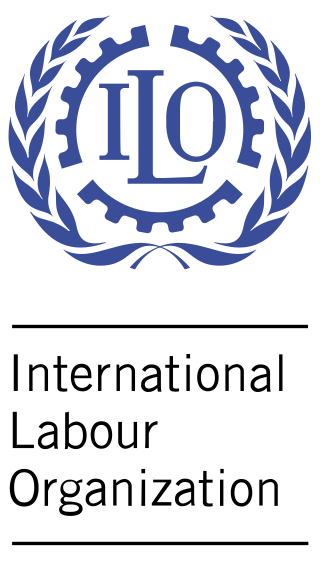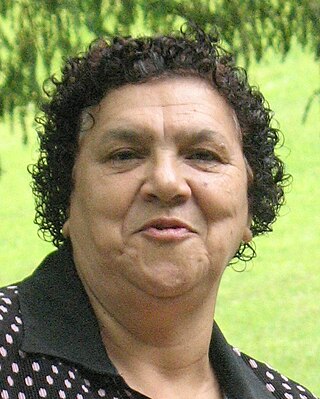Related Research Articles

The International Labour Organization (ILO) is a United Nations agency whose mandate is to advance social and economic justice by setting international labour standards. Founded in October 1919 under the League of Nations, it is the first and oldest specialised agency of the UN. The ILO has 187 member states: 186 out of 193 UN member states plus the Cook Islands. It is headquartered in Geneva, Switzerland, with around 40 field offices around the world, and employs some 3,381 staff across 107 nations, of whom 1,698 work in technical cooperation programmes and projects.

An informal economy is the part of any economy that is neither taxed nor monitored by any form of government. Although the informal sector makes up a significant portion of the economies in developing countries, it is sometimes stigmatized as troublesome and unmanageable. However, the informal sector provides critical economic opportunities for the poor and has been expanding rapidly since the 1960s. Integrating the informal economy into the formal sector is an important policy challenge.

A domestic worker or domestic servant is a person who works within the scope of a residence. The term "domestic service" applies to the equivalent occupational category. In traditional English contexts, such a person was said to be "in service". Domestic workers perform a variety of household services for an individual, from providing cleaning and household maintenance, or cooking, laundry and ironing, or care for children and elderly dependents, and other household errands.
Labor rights or workers' rights are both legal rights and human rights relating to labor relations between workers and employers. These rights are codified in national and international labor and employment law. In general, these rights influence working conditions in relations of employment. One of the most prominent is the right to freedom of association, otherwise known as the right to organize. Workers organized in trade unions exercise the right to collective bargaining to improve working conditions.

The World Confederation of Labour (WCL) was an international labour organization founded in 1920 and based in Europe. Totalitarian governments of the 1930s repressed the federation and imprisoned many of its leaders, limiting operations until the end of World War II. In 2006 it became part of the International Trade Union Confederation (ITUC), ending its existence as an independent organization.

Self-Employed Women's Association (SEWA), meaning "service" in several Indian languages, is a trade union based in Ahmedabad, India, that promotes the rights of low-income, independently employed female workers. Nearly 2 million workers are members of the Self-Employed Women’s Association across 8 states in India. Self-employed women are defined as those who do not have a fixed employer-employee relationship and do not receive a fixed salary and social protection like that of formally-employed workers and therefore have a more precarious income and life. SEWA organises around the goal of full employment in which a woman secures work, income, food, and social security like health care, child care, insurance, pension and shelter. The principles behind accomplishing these goals are struggle and development, meaning negotiating with stakeholders and providing services, respectively.

Women in Informal Employment: Globalizing and Organizing (WIEGO) is a Manchester-based global research - policy network focused on improving conditions for workers in the informal economy. WIEGO's members include membership-based organizations of workers in the informal economy, researchers and development professionals.

A migrant worker is a person who migrates within a home country or outside it to pursue work. Migrant workers usually do not have the intention to stay permanently in the country or region in which they work.

Decent work is employment that "respects the fundamental rights of the human person as well as the rights of workers in terms of conditions of work safety and remuneration. ... respect for the physical and mental integrity of the worker in the exercise of his/her employment."
Human rights in the Philippines are protected by the Constitution of the Philippines, to make sure that persons in the Philippines are able to live peacefully and with dignity, safe from the abuse of any individuals or institutions, including the state.
Migrant domestic workers are, according to the International Labour Organization’s Convention No. 189 and the International Organization for Migration, any persons "moving to another country or region to better their material or social conditions and improve the prospect for themselves or their family," engaged in a work relationship performing "in or for a household or households." Domestic work itself can cover a "wide range of tasks and services that vary from country to country and that can be different depending on the age, gender, ethnic background and migration status of the workers concerned." These particular workers have been identified by some academics as situated within "the rapid growth of paid domestic labor, the feminization of transnational migration, and the development of new public spheres." Prominent discussions on the topic include the status of these workers, reasons behind the pursue in this labour, recruitment and employment practices in the field, and various measures being undertaken to change the conditions of domestic work among migrants.

A waste picker is a person who salvages reusable or recyclable materials thrown away by others to sell or for personal consumption. There are millions of waste pickers worldwide, predominantly in developing countries, but increasingly in post-industrial countries as well.
Labour in India refers to employment in the economy of India. In 2020, there were around 476.67 million workers in India, the second largest after China. Out of which, agriculture industry consist of 41.19%, industry sector consist of 26.18% and service sector consist 32.33% of total labour force. Of these over 94 percent work in unincorporated, unorganised enterprises ranging from pushcart vendors to home-based diamond and gem polishing operations. The organised sector includes workers employed by the government, state-owned enterprises and private sector enterprises. In 2008, the organised sector employed 27.5 million workers, of which 17.3 million worked for government or government owned entities. The Human Rights Measurement Initiative finds that India is only doing 43.9% of what should be possible at its level of income for the right to work. Employees are routinely taken advantage of by their employers because of loose labour laws across all industries in India.

The Convention on Domestic Workers, formally the Convention concerning Decent Work for Domestic Workers is a convention setting labour standards for domestic workers. It is the 189th ILO convention and was adopted during the 100th session of the International Labour Organization, in 16 June 2011. It entered into force on 5 September 2013.
Renana Jhabvala is an Indian social worker based in Ahmedabad, India, who has been active for decades in organising women into organisations and trade unions in India, and has been extensively involved in policy issues relating to poor women and the informal economy. She is best known for her long association with the Self-Employed Women's Association (SEWA), India, and for her writings on issues of women in the informal economy.

Martha Chen is an American academic, scholar and social worker, who is presently a lecturer in public policy at the Harvard Kennedy School and senior advisor of the global research-policy-action network WIEGO and a member of the Advisory Board of the United Nations University World Institute for Development Economics Research (UNU-WIDER). Martha is a development practitioner and scholar who has worked with the working poor in India, South Asia, and around the world. Her areas of specialization are employment, poverty alleviation, informal economy, and gender. She lived in Bangladesh working with BRAC, one of the world's largest non-governmental organizations, and in India, as field representative of Oxfam America for India and Bangladesh for 15 years.

The Global Labour Institute in the UK, is part of an international network of not-for-profit organisations with the stated aim of promoting international solidarity among trade union organisations and affiliated groups in order to achieve a democratic and sustainable world society. The major activities of the GLI organisations are developing education, capacity-building and research on international labour movement development, gender policy and organising strategies. The Global Labour Institute works with global union federations, national trade unions, workers' associations, development agencies, research institutions, workers' education organisations and NGOs such as LabourStart, WIEGO and Oxfam, and it states an ideological commitment to democratic socialism.

Myrtle Witbooi was a South African labour activist. She currently serves as the General secretary of the South African Domestic Service and Allied Workers Union (SADSAWU). She also serves the first president of the International Domestic Workers Federation (IDWF), a membership-based global organization of household and domestic workers. Labor scholars have noted IDWF is the "first international labor federation run by women for work dominated by women." In January 2023, she lost her battle with cancer, dying after a valiant and brave fight with the disease.
Migrant workers in the Gulf Cooperation Council region involves the prevalence of migrant workers in the Kingdom of Bahrain, the State of Kuwait, the Sultanate of Oman, the State of Qatar, the Kingdom of Saudi Arabia and the United Arab Emirates (UAE). Together, these six countries form the Gulf Cooperation Council (GCC), established in 1981. The GCC cooperates on issues related to economy and politics, and the subject of migrant workers constitutes a substantial part of the council's collaboration. All of the GCC countries are dependent on migrant labor to bolster and stimulate economic growth and development, as the GCC countries possess an abundance of capital while the domestic labor capacity is low. Although migrant workers in the Persian Gulf region amount to no more than 10% of all migrants worldwide, they constitute a significant part of the populations of their host countries.
The National Network of Informal Workers in the Philippines is a trade union of informal workers, especially home-based workers, in the Philippines.
References
- ↑ "IDWF". DevEx. Archived from the original on 26 April 2021. Retrieved 26 April 2021.
- ↑ "Domestic Workers of the World and the International Domestic Workers' Federation- IDWF" (PDF). ILO. International Labour Organization. Archived (PDF) from the original on 26 April 2021. Retrieved 26 April 2021.
- ↑ Christine, Bonner. "Domestic Workers Around the World: Organising for Empowerment" (PDF). WIEGO. Women in Informal Employment: Globalizing and Organizing (WIEGO). Archived (PDF) from the original on 26 April 2021. Retrieved 26 April 2021.
- ↑ Hoerder, Dick, ed. (2015). Towards a Global History of Domestic and Caregiving Workers. Brill. ISBN 978-90-04-28014-4. Archived from the original on 2021-02-24. Retrieved 2021-04-26.
- ↑ Karin, Pape (April 1, 2016). "ILO Convention C189—a good start for the protection of domestic workers: An insider's view". Progress in Development Studies. 16 (2): 189–202. doi:10.1177/1464993415623151. S2CID 155176264. Archived from the original on 26 April 2021. Retrieved 26 April 2021.
- ↑ "A Domestic Workers' Federation is Born". WIEGP. Archived from the original on 26 April 2021. Retrieved 26 April 2021.
- ↑ "International Domestic Workers Federation (IDWF)". Migration Network. United Nations. Archived from the original on 26 April 2021. Retrieved 26 April 2021.
- ↑ "Domestic workers". UN Women. Archived from the original on 19 January 2021. Retrieved 26 April 2021.